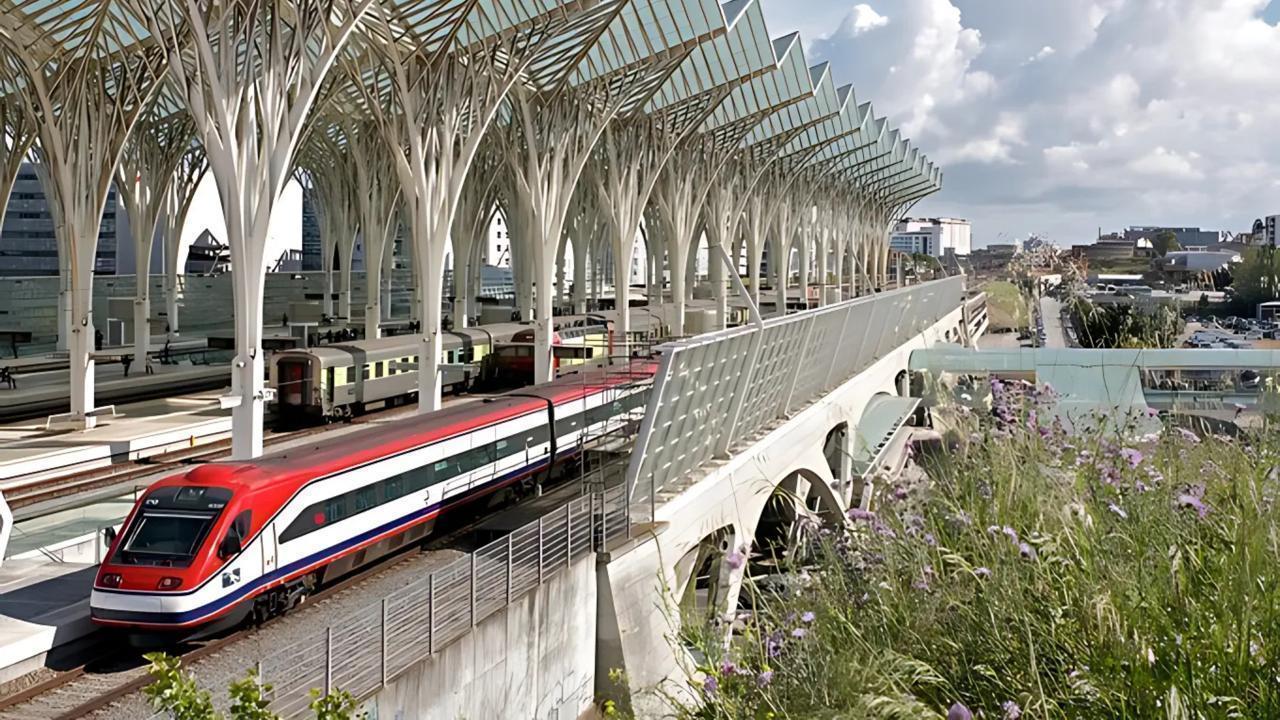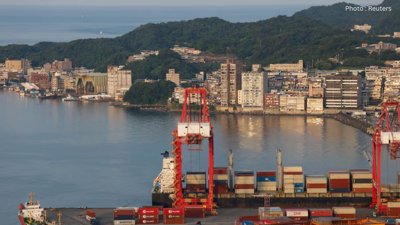
Post by : Amit
A Strategic Upgrade for Coastal Comfort
Portugal is embarking on a quiet revolution along its picturesque coastline—one not of tracks or timetables, but of temperature, air quality, and salt. In a significant move to modernize its public transportation system while adapting to intensifying maritime weather conditions, Comboios de Portugal (CP), the national railway operator, has begun rolling out a new generation of salt-resistant HVAC systems across its coastal train services.
The new HVAC (Heating, Ventilation, and Air Conditioning) systems are designed specifically to handle the harsh corrosive impact of Atlantic salt-laden air, which has long posed a challenge to the longevity and reliability of mechanical components onboard trains traversing Portugal’s scenic but punishing coastline.
From Cascais to Faro, trains will now breathe better—while their passengers enjoy cleaner, cooler air.
A Battle Against Coastal Corrosion
Portugal’s coastline stretches over 1,200 kilometers, with key rail corridors hugging the sea in places like Lisbon, Porto, Aveiro, and the Algarve. While the ocean provides a spectacular backdrop for travelers, it brings with it a persistent engineering challenge: corrosion caused by airborne saline particles.
For decades, HVAC systems in CP’s coastal trains have suffered from accelerated degradation. Filters clog faster, coils corrode, and air ducts suffer from persistent mold and rust issues. This not only drives up maintenance costs but also compromises passenger comfort—particularly during summer months when trains are packed with tourists and locals alike.
In recent years, rising humidity linked to climate change has further intensified salt crystallization inside ventilation ducts and heat exchangers. “The sea has always been beautiful, but it’s merciless to metal,” said João Martins, an HVAC engineer with CP’s technical services division. “We were servicing systems every 18 months instead of every five years.”
Engineering a Salt-Resistant Solution
In 2023, CP partnered with two domestic HVAC solution providers—Frigomare Engenharia and Airnova Technologies—to co-develop a customized HVAC system that could withstand the high salt, humidity, and heat loads specific to Portugal’s Atlantic-facing trains.
After over a year of testing prototypes along the Linha de Cascais, a 25-kilometer commuter line that runs close to the Atlantic Ocean, CP finalized a design built around marine-grade aluminum evaporator coils, anti-corrosion polymer coatings, and nano-filtration systems designed to trap micro-salts before they enter air channels.
The key innovation lies in the multi-stage air intake system. Ambient air first passes through a salt aerosol separator, a fine mesh that captures up to 90% of airborne salt crystals. The air then travels through HEPA filters and UV-C sterilization chambers before reaching passengers. This not only helps protect the equipment but dramatically improves air quality, reducing allergens and mold spores that flourish in humid, salty conditions.
Trial Success and Deployment Rollout
After the six-month trial yielded a 30% reduction in corrosion-related maintenance, CP approved a €17.5 million contract to retrofit 48 coastal train units with the new systems between 2025 and 2027. The first commercial units were installed on the Alfa Pendular express services that link Porto to Faro, with priority given to trainsets that pass closest to the ocean.
So far, 12 trains have been fitted with the salt-resistant HVAC systems. “We are seeing improved airflow and lower coil failure rates across the board,” confirmed Helena Carvalhosa, head of rolling stock operations at CP. “Passenger complaints about musty air or inconsistent cooling have dropped by nearly 40%.”
In parallel, CP is also working on retrofitting older Intercidades trains along the southern coastal corridor. By the end of 2026, over 75% of Portugal’s coastal fleet is expected to run with the upgraded systems.
Meeting Passenger Expectations in a Tourism Hub
Portugal is among Europe’s most visited coastal nations, with a record 32 million tourists recorded in 2024. Trains remain the preferred travel mode for many, especially along the sun-drenched Algarve coast. Yet, visitors have frequently complained about subpar ventilation and stuffy compartments—especially during peak months.
The HVAC upgrade is a direct response to those complaints. The new system is calibrated for rapid cooling cycles suitable for hot, humid, and crowded conditions, ensuring cabins stay below 24°C even when exterior temperatures cross 35°C. For winter months, the heat-pump integration offers efficient low-temperature heating, with smart humidity control to prevent condensation on windows—a common issue in older coaches.
Environmental and Energy Benefits
Interestingly, the upgrade is not just about comfort. It’s also a win for sustainability. The new HVAC units are 22% more energy efficient, thanks to inverter-based compressors and smart load-balancing algorithms. When train occupancy is low, the system reduces output automatically, saving both power and wear.
Additionally, Airnova’s patented thermal reclaim module allows waste heat from compressors to be reused in water heating systems for onboard lavatories and kitchens, further reducing electricity consumption.
According to CP’s own estimates, the upgraded trains will collectively save 1.2 gigawatt-hours of electricity per year, equivalent to the annual consumption of 350 Portuguese households.
Supporting Local Industry and R&D
This initiative is not just a tech upgrade—it’s also an industrial policy move. Over 85% of system components are locally sourced, including specialized corrosion-proof hardware produced in Porto and smart control panels made in Setúbal. The program supports over 120 domestic jobs, including R&D positions, assembly line roles, and maintenance retraining programs.
In tandem, the University of Aveiro has launched a research partnership with CP and Frigomare to study salt accumulation dynamics on rolling stock, leveraging data from sensors installed on test trainsets. This effort is expected to feed into Portugal’s broader coastal infrastructure resilience strategy, especially relevant as sea levels and humidity continue to rise.
Challenges and Future Optimizations
While the initial rollout has been smooth, there are challenges ahead. Some older trains with narrow undercarriage spaces face difficulty accommodating the larger modular HVAC systems. Engineers are now developing slimline versions with the same salt-resistant features but lower profile designs.
There’s also the issue of long-term filter replacement costs, which could rise due to the high frequency of use. CP plans to test self-cleaning pre-filters next year to bring maintenance costs down and reduce downtime.
Another pending upgrade involves sensor-driven climate customization for passengers. CP is experimenting with seat-zone-based microclimate control in premium coaches, which may soon allow passengers to select individual air vent intensity and temperature.
A Model for Europe’s Coastal Rail Operators?
With countries like Spain, Italy, Greece, and France operating extensive coastal rail services, Portugal’s salt-resistant HVAC rollout has caught the attention of European peers. Delegations from Renfe (Spain) and SNCF (France) have reportedly reviewed the Cascais line results, with both considering similar upgrades for their Mediterranean train routes.
The European Railway Agency (ERA) is also evaluating a joint technical report from CP and Airnova, which may be included in upcoming EU guidelines for resilient public transport in coastal regions.
“There’s growing awareness that the environment isn’t just outside the train—it’s coming in through the vents,” said ERA policy advisor Pierre Lemoine. “Portugal’s HVAC initiative is a real-world model of climate adaptation and passenger-centric design.”
A Breezier, Cleaner Future for Rail Passengers
Portugal’s decision to address HVAC failures not just as technical malfunctions but as a systemic coastal infrastructure issue marks a refreshing shift in European public transport planning. While invisible to many, these systems define the passenger experience, especially in long-haul and high-density conditions.
As summers get hotter and tourist numbers swell, CP’s salt-resistant HVAC systems are a timely investment—one that blends engineering foresight, climate adaptation, and passenger care into a single cool breeze.
In doing so, Portugal has turned a corrosive coastal challenge into a breath of fresh air for rail travel.
Portugal, HVAC System, Train










Advances in Aerospace Technology and Commercial Aviation Recovery
Insights into breakthrough aerospace technologies and commercial aviation’s recovery amid 2025 chall

Defense Modernization and Strategic Spending Trends
Explore key trends in global defense modernization and strategic military spending shaping 2025 secu

Tens of Thousands Protest in Serbia on Anniversary of Deadly Roof Collapse
Tens of thousands in Novi Sad mark a year since a deadly station roof collapse that killed 16, prote

Canada PM Carney Apologizes to Trump Over Controversial Reagan Anti-Tariff Ad
Canadian PM Mark Carney apologized to President Trump over an Ontario anti-tariff ad quoting Reagan,

The ad that stirred a hornets nest, and made Canadian PM Carney say sorry to Trump
Canadian PM Mark Carney apologizes to US President Trump after a tariff-related ad causes diplomatic

Bengaluru-Mumbai Superfast Train Approved After 30-Year Wait
Railways approves new superfast train connecting Bengaluru and Mumbai, ending a 30-year demand, easi